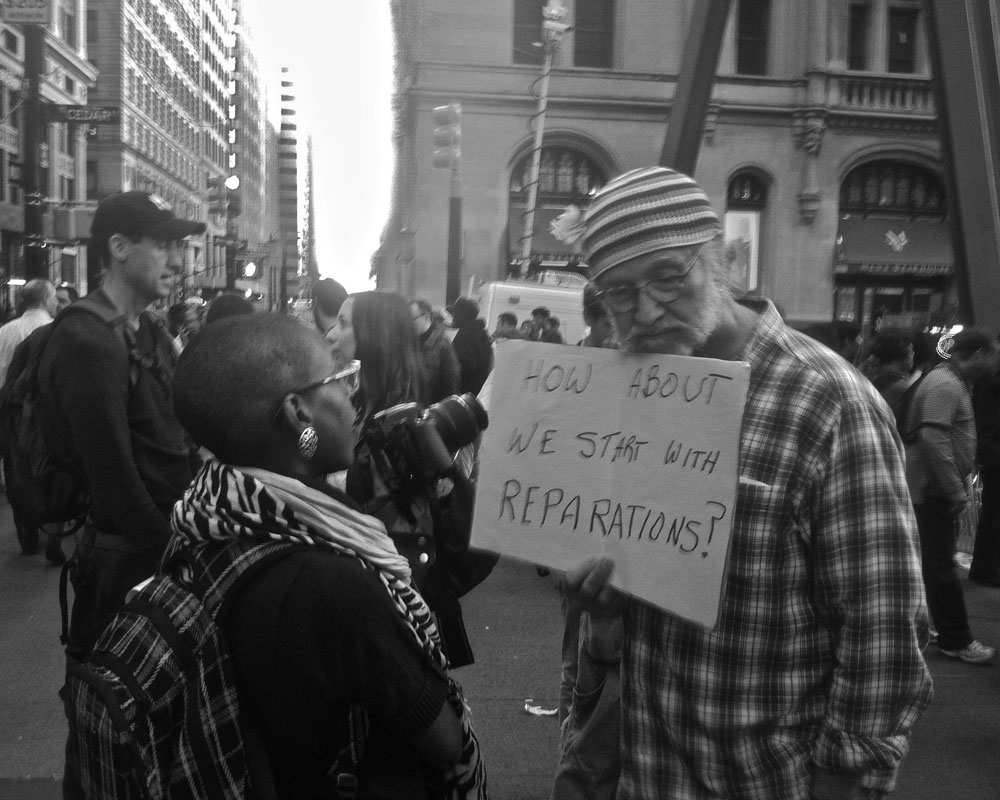
June 19, 2019; New York Times and The Root
For over two decades, Representative John Conyers (D-MI) would introduce HR 40, titled the “Commission to Study and Develop Reparation Proposals for African-Americans Act,” and the bill would languish. Conyers left Congress in 2017, but Representative Sheila Jackson Lee (D-TX) picked up the baton. And yesterday, at last, the US House of Representatives held hearings to consider how the nation might make amends for the incalculable economic, physical, and emotional costs caused by slavery, segregation, and ongoing racism.
As Sheryl Gay Stolberg writes in the New York Times, “Both the hearing and the bill are freighted with symbolism.” The hearing date, June 19th, corresponds to Juneteenth, the date in 1865 that enslaved people in Galveston, Texas, finally learned of Emancipation. The HR 40 bill number itself refers to the unfulfilled promise to provide freed slaves with “40 acres and a mule“ after the Civil War.
But more than symbols are at stake. Not only has a hearing finally been held, but the bill has real momentum. As Stolberg explains, “Nearly 60 House Democrats…support legislation to create the commission.” Among them is Speaker Nancy Pelosi, who anticipates that the commission would develop proposals “to repair the lingering effects of slavery.”
The US has yet to reckon with the severe costs posed by its original sins of slavery or Native American genocide, reinforced by policies that continue to disadvantage Blacks and Native Americans to this day. Passing HR 40 would not undo this damage, but it does provide a place to start.
“The bill,” Stolberg explains, “would authorize $12 million for a 13-member commission—three members appointed by the president, three by the House, one by the Senate and six from organizations that have championed racial justice. The panel would study the effects of slavery and racial discrimination, hold hearings across the country and recommend ‘appropriate remedies’ to Congress.”
Speaking to The Root, Dr. Julianne Malveaux, an economist who spoke at today’s hearing, notes that, “It’s an idea whose time has come.” Malveaux told The Root that to her, reparations are about more than economic compensation, although that “could be part of the conversation.” She listed “investment in historically black colleges and universities and black businesses as other possible components of a comprehensive reparations proposal.”
As NPQ’s Cyndi Suarez noted earlier this year, the Movement for Black Lives, the global network of the Black Lives Matter movement, has developed a reparations statement that focuses in five areas:
Sign up for our free newsletters
Subscribe to NPQ's newsletters to have our top stories delivered directly to your inbox.
By signing up, you agree to our privacy policy and terms of use, and to receive messages from NPQ and our partners.
- Free, high quality, life time education opportunities
- Guaranteed minimum livable income
- Healing trauma, and ensuring access and control of food, housing, and land
- Mandated public school curricula that critically examine slavery and its impacts, and funding to restore and preserve cultural assets and sacred sites
- Federal and state level plans to address the impacts of slavery, including passage of HR 40
At the hearing, Rep. Jackson Lee, who as author of the bill opened the hearing, said that HR 40 would be a “long overdue” response to slavery. “Slavery,” she noted, “is the original sin.”
A number of expert witnesses also spoke at the hearing. Among them was Ta-Nehisi Coates, author of the 2014 Atlantic essay, “The Case for Reparations.” Coates emphasized the continued impact of racial discrimination in the present. “The typical black family in this country has one-tenth the wealth of the typical white family. Black women die in childbirth at four times the rate of white women, and there is of course the shame of this land of the free boasting the largest prison population on the planet, of which the descendants of the enslaved make up the largest share,” Coates said.
Malveaux, in her remarks, made a similar point, “When ZIP code determines what kind of school that you go to, when ZIP code determines what kind of food you eat—these are the vestiges of enslavement that a lot of people don’t want to deal with.”
Actor Danny Glover, who also spoke at the hearing, rhetorically asked, “Why is the issue of equality still so far from solution in America, a nation that professes itself to be democratic, inventive, hospitable to new ideas, rich, productive, and awesomely powerful?”
Glover’s response to his own query: “The problem is so tenacious because, despite its virtues and attributes, America is deeply racist, and its democracy is flawed both economically and socially.”
What happens now? While the bill has a decent chance of passing the US House of Representatives, “it has virtually no chance of Senate passage or President Trump signing it,” Stolberg observes. But the point is to set the table for the bill’s passage in the future, when there might be a Democratic president and perhaps a Democratic-led Senate.
“This is not symbolic,” emphasized Jackson Lee. “It’s not a symbolic hearing; it’s not symbolic because of the day; it’s not symbolic because of the commission. It’s legislation that we think has finally reached its moment.”—Steve Dubb










